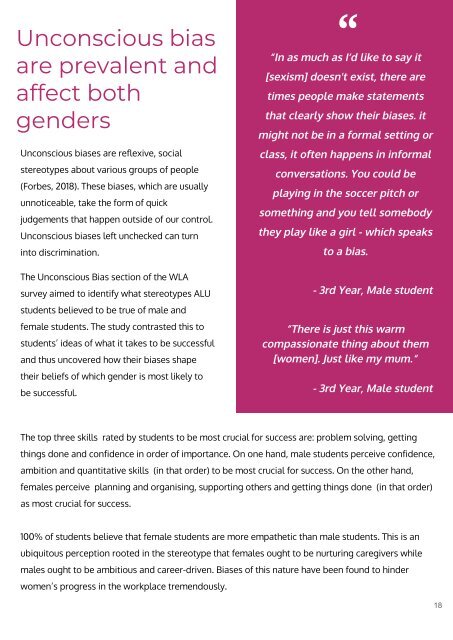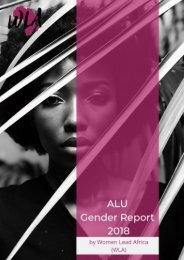You also want an ePaper? Increase the reach of your titles
YUMPU automatically turns print PDFs into web optimized ePapers that Google loves.
Unconscious bias<br />
are prevalent and<br />
affect both<br />
genders<br />
Unconscious biases are reflexive, social<br />
stereotypes about various groups of people<br />
(Forbes, <strong>2018</strong>). These biases, which are usually<br />
unnoticeable, take the form of quick<br />
judgements that happen outside of our control.<br />
Unconscious biases left unchecked can turn<br />
into discrimination.<br />
The Unconscious Bias section of the <strong>WLA</strong><br />
survey aimed to identify what stereotypes ALU<br />
students believed to be true of male and<br />
female students. The study contrasted this to<br />
students’ ideas of what it takes to be successful<br />
and thus uncovered how their biases shape<br />
their beliefs of which gender is most likely to<br />
be successful.<br />
“<br />
“In as much as I’d like to say it<br />
[sexism] doesn't exist, there are<br />
times people make statements<br />
that clearly show their biases. it<br />
might not be in a formal setting or<br />
class, it often happens in informal<br />
conversations. You could be<br />
playing in the soccer pitch or<br />
something and you tell somebody<br />
they play like a girl - which speaks<br />
to a bias.<br />
- 3rd Year, Male student<br />
“There is just this warm<br />
compassionate thing about them<br />
[women]. Just like my mum.“<br />
- 3rd Year, Male student<br />
The top three skills rated by students to be most crucial for success are: problem solving, getting<br />
things done and confidence in order of importance. On one hand, male students perceive confidence,<br />
ambition and quantitative skills (in that order) to be most crucial for success. On the other hand,<br />
females perceive planning and organising, supporting others and getting things done (in that order)<br />
as most crucial for success.<br />
100% of students believe that female students are more empathetic than male students. This is an<br />
ubiquitous perception rooted in the stereotype that females ought to be nurturing caregivers while<br />
males ought to be ambitious and career-driven. Biases of this nature have been found to hinder<br />
women’s progress in the workplace tremendously.<br />
18




